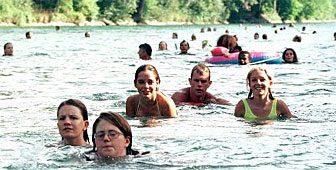
Drowning deaths raise questions over safety liability

More people have drowned in Switzerland's lakes and rivers this summer than in the year before, and the Swiss Life Saving Society says a lack of trained lifeguards may contribute to the "alarming" problem.
So far this summer, 44 people have died in swimming accidents – almost as many as over the entire previous year, according to the life saving society, which released the figures. More than three quarters of the deaths occurred in rivers (23 people killed) and lakes (12 deaths). The other victims drowned in pools.
The SLSS warns that many accidents happen because swimmers neglect safety recommendations. But the rainy weather in July also played a role. By the time the weather finally became hot three weeks ago, Switzerland’s rivers were full, fast and dangerous.
Lunch and a swim
Swimming in rivers and lakes is a popular summer pastime in the country. Thousands of office workers in Geneva, Basel, Bern, Zurich and elsewhere spend their lunch breaks in river or lake baths and return for a cool swim after work.
But SLSS says the swimmers may be endangered by the lack of safety provisions. SLSS director, Daniel Frei, told swissinfo that many local governments “are dried of funds or have difficulty finding professional, trained lifeguards.” Many public baths have cut down on the number of employed lifeguards, he said.
The problem is particularly visible near rivers and lakes. Most public baths on natural shores seem not to assume responsibility for the safety of swimmers once they leave the pools and other amenities the baths operate.
One of Switzerland’s most popular river baths, the Marzili in Bern, has installed special lifeguard seats along a stretch of the fast Aare river where thousands of swimmers pass on a hot day – but the seats invariably are empty.
Plunge into Rhine inadvisable
In Zurich, the fashionable Utoquai bath that stands on stalks in the lake does have a lifeguard. But on an afternoon this week, the guard seemed neither equipped with a boat nor binoculars. A fixed sign warns swimmers not to rely on the lifeguard who “will not always be present”.
Basel’s river police publish safety recommendations for the benefit of swimmers who dare the powerful Rhine River – not to jump from bridges, to keep to the shore, to look out for barges. But most rules cannot be enforced.
A police boat patrols the four kilometres where the Rhine flows through the city, but otherwise no lifeguard service is provided. “It’s impossible to patrol all of Switzerland’s lakes and rivers”, says Herbert Benz, head of the Basel river police unit; “by the same token, we’d have to put mountain guides along alpine climbing trails where many people behave equally irresponsibly”.
Are local governments liable?
Pierre Widmer, law professor at the university of Lausanne and an expert on liability law, says public river baths and local governments running them are wrong not to assume responsibility.
“There is a parallel with ski-lifts; according to Swiss law, they can be held liable not only if accidents happen on their installations, but also on a downward slope connected with the lift,” Widmer said in an interview with swissinfo.
Responsibility would normally extend to local governments operating swimming baths, as most cantons provided for the liability of their administrations, Widmer says. But no relatives of drowning victims, or survivors of swimming accidents that took other lives, have so far sued a Swiss public institution for neglect.
Widmer says that while it is impossible to protect the lives of swimmers in every river and lake for obvious reasons, a distinction should be made between areas off the beaten track and the more popular spots where probably close to 90 per cent of the swimming outside pools is done. “If the question would have to be decided by a court, it would probably find that the liability is greater in those areas”.
Liability laws are more explicit in other countries. In Germany, Belgium and the UK, local governments must ensure the safety of swimmers, regardless of whether they operate baths or other water sports amenities.
In Germany, governments contract with the German Life Saving Society (GLSS), which provides paid lifeguards and is present “in all the popular spots with guards and boat patrols” according to its director, Ludger Schulte-Hülsmann.
Schulte-Hülsmann is convinced that lifeguards are effective. “On average we save one person’s life to every person who drowns; it means we’d probably have twice the number in tragic deaths if no lifeguarding was provided”.
Frei said the lifeguard society would welcome stricter Swiss regulations and the use of more professional lifeguards. “But I guess we just don’t have that kind of culture – safety concerns are followed discreetly here, and we seem to prefer to rely on the work of volunteers”.
by Markus Haefliger

In compliance with the JTI standards
More: SWI swissinfo.ch certified by the Journalism Trust Initiative





























You can find an overview of ongoing debates with our journalists here . Please join us!
If you want to start a conversation about a topic raised in this article or want to report factual errors, email us at english@swissinfo.ch.